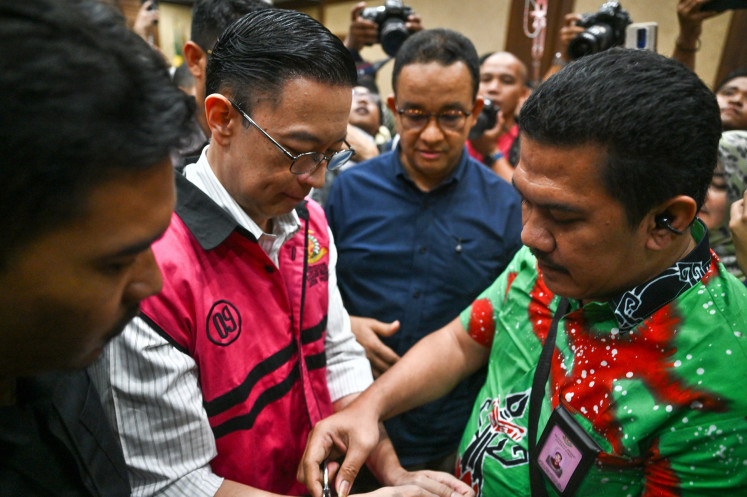Popular Reads
Top Results
Can't find what you're looking for?
View all search resultsPopular Reads
Top Results
Can't find what you're looking for?
View all search resultsRI’s plan to build new refineries in limbo
Despite growing pressure from soaring oil consumption, Indonesia’s long desire to build new refineries is now caught between the government’s reluctance to grant incentives demanded by investors and the non-availability of state budget to build by its own
Change text size
Gift Premium Articles
to Anyone
D
espite growing pressure from soaring oil consumption, Indonesia’s long desire to build new refineries is now caught between the government’s reluctance to grant incentives demanded by investors and the non-availability of state budget to build by its own.
An energy expert from the ReforMiner Institute, Pri Agung Rakhmanto, acknowledged that setting up new refineries was a very tough job for the government as the sources of funding were limited.
“There are only two options: If the government doesn’t want to build refineries with its own money, it has to be a good facilitator for investors by granting the incentives they demand,” he told a discussion on energy security hosted by the Centre for Strategic and International Studies in Jakarta on Wednesday.
The government could not be reluctant in giving incentives to potential investors because many other countries in the Asia-Pacific region offered more interesting packages, such as cheap land leases and other fiscal incentives, to make their countries attractive investment destinations, he added.
He cited Thailand as an example, which offers duty-free imports of refinery machines and other components, a tax holiday lasting between three and eight years, and a 50 percent reduction cut in corporate taxes for between two and five years after the expiration of the tax holiday.
Vietnam offers corporate tax reductions, free leases for land used for refinery projects, a four-year corporate income tax holiday, duty-free imports of machines, components and materials that cannot be produced in the country, and value-added tax waivers for imported goods.
In India, the government waives import duties for materials used in refinery construction, operation and maintenance as well as income taxes for the first five years and provides a 50 percent discount for the next five years of a refinery’s operation. It also exempts refineries from regional taxes, services taxes and several other costs applied by the state.
“If the government doesn’t want to be driven by investors, it has to build the refineries with its own money,” Pri Agung emphasized.
To ensure that the project would be run well, Pri Agung added, it had to be included in the State Revenues and Expenditures Budget or the government needed to issue an official letter of assignment to Pertamina to build refineries and guarantee the projects. With such a mechanism, the House of Representatives could supervise the projects so that the execution of all activities could be more reliable and transparent as well as on schedule.
Responding to Pri Agung’s statement, the Finance Ministry’s acting fiscal policy office director, Bambang Brodjonegoro, said incentives demanded by Kuwait Petroleum, the prospective investor in the construction of a refinery in Balongan, were “too exaggerated”.
“The company demands that the government provide long-term tax holiday, 5 percent income tax for life and free regional taxes,” he told reporters after the discussion.
“It has to be decided by the government’s highest authority. If the decision is out, we’ll give the incentives right away,” he added.
To build refineries with state funds, the government and the House had to agree first to cut the budget devoted to energy subsidies, Bambang said.
“We can build [refineries] on our own if we spend our money right, rather than allocating most of it for subsidies,” he said.
Pertamina data shows that even if Kuwait Petroleum built the extension of the Balongan refinery and Saudi Aramco builds the Tuban refinery, Indonesia will still experience a total deficit in 2025 of 35.5 million kiloliters of gasoline, or equal to 2.6 million barrels per day (bpd). To meet projected demand, the country has to build nine additional refineries.










